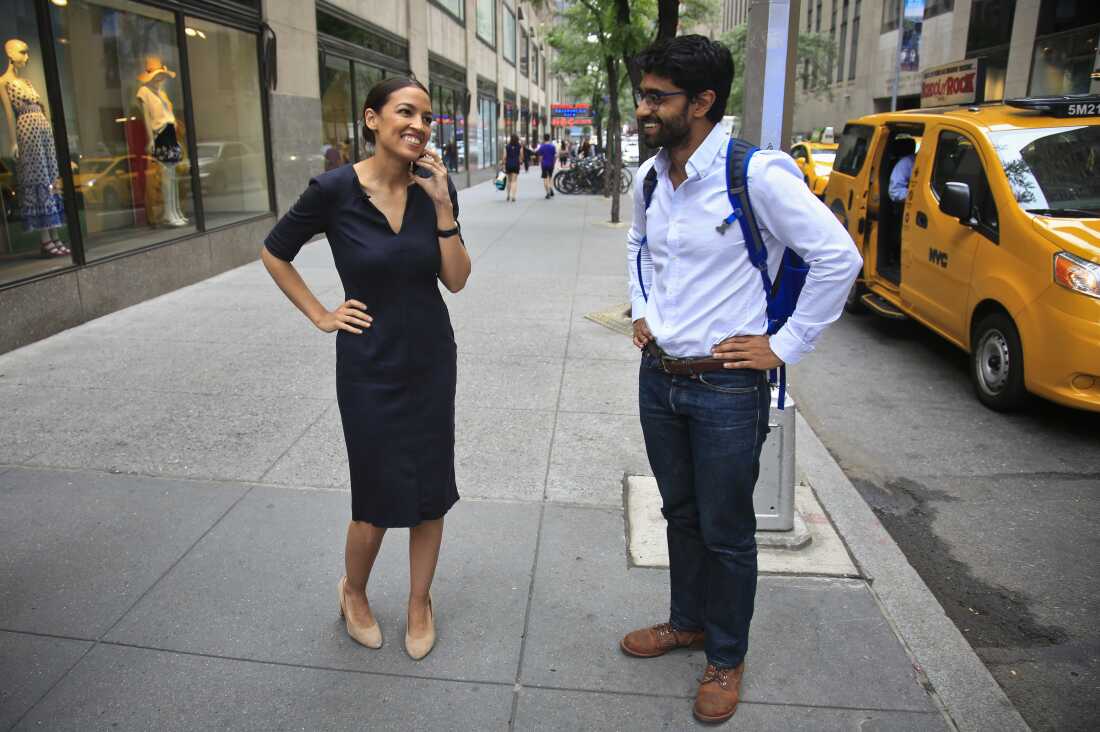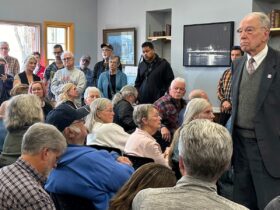From left, Saikat Chakrabarti, Kat Abughazaleh and Elijah Manley are among a crop of young Democrats challenging incumbents in solidly blue districts across the country ahead of next year’s midterm elections.
Saikat Chakrabarti, Kat Abughazaleh, Elijah Manley/Compiled by NPR
hide caption
toggle caption
Saikat Chakrabarti, Kat Abughazaleh, Elijah Manley/Compiled by NPR
Elijah Manley was still a teenager when his frustration with President Trump pushed him to get involved in politics. Today, he’s finally old enough to run for Congress. Upset with how his own Democratic Party is responding to Trump, he’s decided to do just that.
Manley is a 26-year-old substitute history teacher based in Fort Lauderdale, Florida. He’s never held elected office but has spent years organizing with local and national progressive groups.
He says he’s grown tired of watching Democrats, in his view, fail to be aggressive enough in their response to Trump. So in February, Manley launched a primary challenge against incumbent Democrat Sheila Cherfilus-McCormick for Florida’s 20th District.
“We’re stuck in this era right now,” he said. “What’s going to fix that is thinking bigger and being bolder and we’re not seeing that in the Democratic Party.”
With his leap into the race, Manley joins a growing group of at least five Gen Z and millennials under 40 who have recently launched bids to unseat incumbent House Democrats in solidly blue districts around the country. In California, that includes a primary challenge to former House Speaker Nancy Pelosi from a one-time aide to Alexandria Ocasio-Cortez, while in Illinois, a content creator is running for a seat held by a 13-term incumbent Democrat.
For many of these young candidates, their campaigns are centered around a shared dissatisfaction with how sitting lawmakers have fought back against Trump’s second term agenda. They hope to bring a new generation of leadership to Washington — even if they face long odds.
Democratic leaders are divided on whether to support this effort, as some worry it could strain resources for competitive races and lead to infighting within the party. However, others argue supporting primary challengers may be necessary if the party wants to move forward and learn from its 2024 election loss.
“If we don’t even put up a fight, what are we doing?”
Manley has run for office before, with unsuccessful bids for state and local office, starting at 19 years old. But shortly before Trump took office in January, he made up his mind about his next step.
“[Democrats] didn’t have a message, didn’t have a strategy of what we’re going to do to fight back,” he said.
It’s a theme he returns to when he talks about his frustration with Democrats. One example he points to is the decision last month by Senate Minority Leader Chuck Schumer, D-N.Y., to help advance a GOP spending bill in order to avoid a government shutdown.
“Why is it that the Republicans, when they’re in the minority, they’re always able to block, obstruct … But when we’re in the minority, we somehow just don’t know how to do anything,” he said.
“We’re not going to win every battle,” he added. “But if we don’t even put up a fight, what are we doing?”

After growing up facing poverty and homelessness, Elijah Manley says he would add a needed perspective in Congress. “I want us to focus on bettering people’s quality of life and making sure that no child experiences homelessness and has to shower at the beach before they go to school,” he said. Above, Manley joins with McDonald’s workers and labor activists to protest against the restaurant chain on May 19, 2021 in Fort Lauderdale, Fla.
Joe Raedle/Getty Images
hide caption
toggle caption
Joe Raedle/Getty Images
Manley has sought to draw a contrast between himself and Cherfilus-McCormick in his still nascent campaign.
He says Cherfilus-McCormick, who came into office in 2022, has been an absent representative for his community and a “distraction.” She’s been embattled in legal controversy surrounding her family’s company, which is being sued by the state for allegedly overcharging it by nearly $6 million for work done during the pandemic. She was also the subject of a recent congressional ethics investigation that found she may have violated campaign finance law.
In a statement, Cherfilus-McCormick defended her time in office.
“My constituents know that I have been fighting for them like a mama bear fights for her cubs. And that is why I have strong support in my district,” she said. “There is a real fight going on right now for the American people and I am on the frontline fighting,” she added. “While he sits on the sidelines criticizing. I am in the ring throwing punches that are landing.”
Still, Manley’s message appears to be resonating. Since announcing in February, Manley’s campaign has outraised Cherfilus-McCormick 18 fold.
The long odds of toppling an incumbent
Challenging an incumbent can sometimes seem like a fool’s errand. In last year’s election, 96% of incumbents in the House won their race for reelection.
But if there is one case study that young challengers like to point to, it’s Ocasio-Cortez, who at 28 years old successfully challenged Democratic Rep. Joe Crowley in the New York primary and pulled off a historic upset.
Saikat Chakrabarti helped manage that campaign. Now, Chakrabarti, 39, is staging a primary challenge of his own, vying to unseat former Speaker Pelosi in San Francisco.
It’s a matchup he knows is different than Ocasio-Cortez’s primary bid in 2018. Pelosi is arguably the most well known Democrat in the House and has served for nearly four decades in Washington. But when he thinks back to what helped get Ocasio-Cortez over the finish line, part of it was that Democrats underestimated the moment.

As a congressional candidate, Saikat Chakrabarti has a unique resume. Before his time in progressive politics, he worked in tech as a founding engineer for the payments platform Stripe. Key to his campaign is improving American wages and bettering access to affordable health care, housing and education. Above, Ocasio-Cortez and Chakrabarti on June 27, 2018, in New York.
Bebeto Matthews/AP
hide caption
toggle caption
Bebeto Matthews/AP
“There was a lot of anger at establishment Democrats for losing the election to Donald Trump and there was a lot of hunger for trying to figure out what comes next,” he said. “I’d say that feeling that existed in 2018, right now, it’s a supercharged version of that.”
That may be true, says Amanda Litman, the founder of the group Run for Something, which helps first-time Democratic candidates run for state and local office. But she cautions that running as an incumbent comes with important built-in advantages.
“For every AOC, there were dozens more who didn’t, who couldn’t, take out the incumbent,” she said, explaining that sitting lawmakers typically have a leg up, from large fundraising networks to a bully pulpit.
That said, Litman is excited by the expanding group of young primary challengers and argued that regardless of the results, these primary campaigns improve the party, particularly by keeping incumbent Democrats on their game. Plus, given how poorly voters currently feel about the Democratic Party, she said some primary challengers could have a chance.
“I think that there is such a frustration with the way things have been done and a sense that — especially in some of these safe blue districts — if you are in a safe blue district, why not be fighting out front?” she said. “Why not be leading in every possible way if you’re not faced by political threat?”
A new perspective for Congress
Kat Abughazaleh in Chicago is aware that voters may be unsure about her.
“I understand people being skeptical of me and frankly I would hope they would be,” Abughazaleh said. “I think that Democrats should have to earn your vote.”
At 26, she is running for Illinois’ 9th Congressional District, held by Jan Schakowsky — who has yet to announce whether she will seek another term.
With a background as a researcher studying far-right politics and conservative media, Abughazaleh had already built up a sizeable platform online when she decided to run for office, with more than half a million followers across TikTok, X, Instagram and YouTube.
Unlike Schakowsky, Abughazaleh does not have deep roots in Chicago. Instead, she moved to the city last summer and currently does not live in the district she wants to represent. Abughazaleh has acknowledged that’s brought criticism.
She moved to Chicago on short notice and is now looking to find a home inside the district, according to her campaign manager, Sam Weinberg.
Though it remains unclear if she can muster up enough local support to be successful next year, Abughazaleh’s campaign has generated buzz online and outraised Schakowsky in early fundraising.
Abughazaleh said her bid is less about bringing a new generation to Congress — even though she’s running for a seat Schakowsky has held since 1999, the year Abughazaleh was born. Instead, she said it’s about being a candidate who can better “understand the reality” many voters are facing.
“The average age of Congress is 20 years older than the average American. Most of our lawmakers didn’t have to deal with school shooter drills growing up,” said Abughazaleh. “They don’t have to worry about out-of-pocket costs at the pharmacy. Most of them have owned a home and don’t have to worry about if their landlords are going to jack up the rent.”
In a statement, Schakowsky said she will decide on her plans soon.
“I have always encouraged more participation in the democratic process, and I welcome new faces getting involved as we stand up against the Trump Administration,” she said. “If I do indeed decide to retire, there are dozens of talented leaders, advocates, and organizers in the 9th Congressional District who know our community and who are ready to lead the charge.”
Friction inside the party
Some young candidates will soon be getting a financial boost from David Hogg, a vice chair at the Democratic National Committee and founder of the group Leaders We Deserve, which is focused on electing younger Democrats to state and federal office. Last week, he announced that part of the group’s $20 million midterm effort would include backing candidates challenging incumbent House Democrats.
“Here’s the reality. Our base is pissed off,” the 25-year-old gun violence activist said in a recent post on Instagram. “We need to show them that we are fighting hard for them and that if somebody is not fighting hard enough for them, that there is a young person willing to replace them.”

David Hogg speaks during a news conference to call for gun reform on Feb. 20, 2023, in Lansing, Mich. Hogg has announced a $20 million midterm effort that he says will include backing candidates challenging incumbent House Democrats.
Al Goldis/AP
hide caption
toggle caption
Al Goldis/AP
The decision sparked criticism from some within the party, who say the focus needs to be on regaining a majority in the House and protecting vulnerable districts rather than weighing in on Democratic primaries.
One top Democrat, House Minority Leader Hakeem Jeffries, has already said he plans to stand by incumbents in his caucus.
“I’m gonna really focus on trying to defeat Republican incumbents so we can take back control of the House of Representatives and begin the process of ending this national nightmare that’s being visited upon us by far-right extremism,” he told told ABC News when asked about Hogg’s effort.
In a statement, Democratic National Committee Chair Ken Martin drew a line in the sand.
“David Hogg is a passionate advocate and we are grateful for his service to the Democratic Party, whether it be in his role as a DNC Vice Chair or in an outside capacity,” he said. “In order to ensure we are as effective as possible at electing Democrats to office, it is the DNC’s longstanding position that primary voters – not the national party – determine their Democratic candidates for the general election.”
Hogg maintains his work is crucial for Democrats, especially if the party wants to win back voters they lost significant ground with in the 2024 election, including young voters. New polling also indicates the youngest cohort of eligible voters, those 18–21, may be swinging more significantly towards the GOP.
“We have to show that our party is changing and we are here to meet the moment for our young people … they feel like there is no future for them,” he said in an interview. “But what we have to do is show how we’re actually fighting for them.”
















Leave a Reply